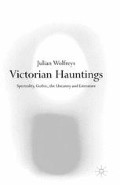Abstract
This chapter takes as part of its title a phrase commonly employed from the late eighteenth century through the first half of the nineteenth to describe the perception of London’s institutional, governmental, financial, and other systematic relationships. Specifically, what is of interest is the ways in which Dickens maintains a certain spectral effect of the fragment in order to announce the condition of reading, writing, and representing London differently. Such an act on Dickens’ part, which is effected as we will see through the exploration of a spectralized epistemology of urban sound as the traces of a revenance constituting the city, is readable as an act of remembering; thus the tracing of the urban conjures, in Peter Nicholls’ words, ‘a forgotten history [which] has the power to shake the social and metaphysical forms against which it breaks …’ With these haunting effects, Dickens arguably projects another city as a resistance to institutional politics in the present, and with that ‘the idea of history as a violent intrusion from somewhere else’.1
Preview
Unable to display preview. Download preview PDF.
Notes
Peter Nicholls, ‘The Belated Postmodern: History, Phantoms, and Toni Morrison’, in Sue Vice (ed.), Psychoanalytic Criticism: A Reader (London: Polity Press, 1996), 50–67; 52.
Charles Dickens, Little Dorrit (1857), ed. and intro. Stephen Wall and Helen Small (London: Penguin, 1998). Hereafter LD.
See, for example, Peter Claus, ‘Languages of Citizenship in the City of London 1847–1867’, London Journal, 24:1 (1999), 23–37. Hereafter LCC.
Richard Price, British Society 1680–1880 (Cambridge: Cambridge University Press, 1999), 182. Apropos urban politics, it is important to recognize, as does Price, that from the 1780s through the 1830s and 40s interests are not necessarily always addressed along party lines, so much as they are according to divisions of interest between the urban and rural, and between London-urban and other urban centres of manufacture, such as Birmingham, Leeds, or Manchester, for example. Thus Whig interests in the City of London may well find opposition or, at least, dissent, in the opinions of rural politicians of the same party.
Manning has commented of Little Dorrit that it is ‘a text paradoxically enmeshed in the system it is trying to criticise’; Sylvia Manning, ‘Social Criticism and Textual Subversion in Little Dorrit’, Dickens Studies Annual, 20 (1991), 127–46; 131.
Andrew Sanders, Dickens and the Spirit of the Age (Oxford: Clarendon Press, 1999), 142. Hereafter DSA.
William J. Palmer, Dickens and New Historicism (New York: St. Martin’s Press — now Palgrave, 1997), 2.
Anny Sadrin, Parentage and Inheritance in the Novels of Charles Dickens (Cambridge: Cambridge University Press, 1994), 77. Hereafter PINCD.
Hilary M. Schor, Dickens and the Daughter of the House (Cambridge: Cambridge University Press, 1999), 129.
John Glavin, After Dickens: Reading, Adaptation and Performance (Cambridge: Cambridge University Press, 1999), 149.
Soultana Maglavera, Time Patterns in Later Dickens: A Study of the Thematic Implications of Temporal Organization of Bleak House, Hard Times, Little Dorrit, A Tale of Two Cities, Great Expectations, and Our Mutual Friend (Amsterdam: Rodopi, 1994), 93.
Hans-Jost Frey, Interruptions (1989), trans. Georgia Albert (Albany, NY: State University Press, 1996), 48.
Pierre Nora, ‘Between Memory and History: Les lieux de mémoire’, Representations, 26 (1989), 12.
The phrase is taken from Martin Heidegger, ‘Building, Dwelling, Think ing’, in Poetry, Language, Thought, trans. and int. Albert Hofstadter (New York: Harper and Row, 1971), 157. Heidegger’s phrase, expressing the idea of being as a form of dwelling, resonates strongly here for the reading of Clennam’s memory as not originary, suggesting as it does the thinking of being and location beyond the individual.
Peter Ackroyd, London: The Biography (London: Chatto and Windus, 2000), hereafter L:TB
Bruce R. Smith, The Acoustic World of Early Modern London: Attending to the O-Factor (Chicago: University of Chicago Press, 1999)
John Stow, The Survey of London, (1598), ed. H. B. Wheatley, int. Valerie Pearl (London: Everyman, 1987).
Ulrich Baer, Remnants of Song: Trauma and the Experience of Modernity in Charles Baudelaire and Paul Celan (Stanford, CA: Stanford University Press, 2000), 253.
Jacques Derrida, ‘“Eating Well”, or the Calculation of the Subject: An Interview with Jacques Derrida’, trans. Peter Connor and Avital Ronell, in Eduardo Cadava, Peter Connor, and Jean-Luc Nancy (eds), Who Comes After the Subject (London: Routledge, 1991), 96–119; 117. Hereafter EW.
Thomas Keenan, Fables of Responsibility: Aberrations and Predicaments in Ethics and Politics (Stanford, CA: Stanford University Press, 1997). Hereafter FR.
Copyright information
© 2002 Julian Wolfreys
About this chapter
Cite this chapter
Wolfreys, J. (2002). Little Dorrit’s ‘land of fragments’. In: Victorian Hauntings. Palgrave, London. https://doi.org/10.1007/978-1-4039-1358-6_5
Download citation
DOI: https://doi.org/10.1007/978-1-4039-1358-6_5
Publisher Name: Palgrave, London
Print ISBN: 978-0-333-92252-1
Online ISBN: 978-1-4039-1358-6
eBook Packages: Palgrave History CollectionHistory (R0)

